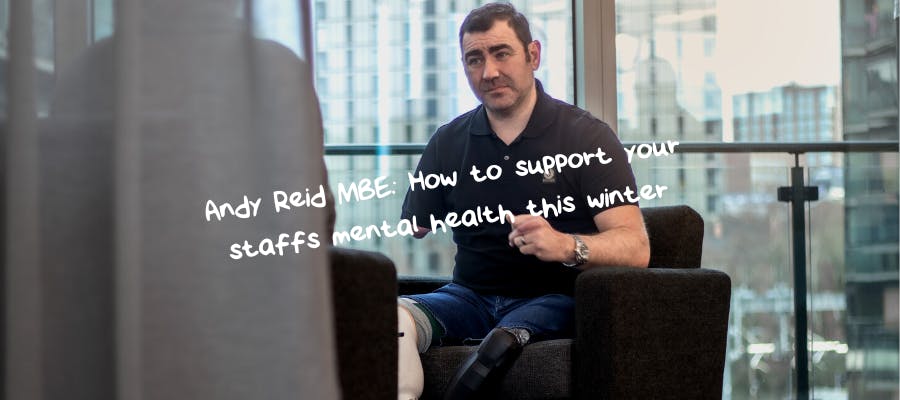First published on Monday, January 23, 2023
Last updated on Monday, January 23, 2023
It’s no secret that winter can be a tough season for both you and your staff’s mental health. With shorter and colder days, winter can wreck sleeping patterns, increase rates of depression, and leave your team feeling seriously demotivated.
We grabbed Andy Reid MBE, Afghan war veteran and Founder of The Standing Tall Foundation, for a Q&A session about the lessons he’s learned supporting his team through winter and his experience with his own mental health at work. He shared his insider knowledge on how business owners can get the most out of their staff year-round. So, let’s jump in…
Q 1. What are some of the best things you’ve learned that business owners can do for their team’s mental health?
“The best thing you can do for your team’s mental health is to listen to your staff. Listen to what problems they’re having and engage with them on the things that matter most to them.
"In my organisation (The Standing Tall Foundation), we provide people with free mental health support. But if you don’t offer that, give your staff time off to speak to a mental health professional if they need to. This will lead to less unplanned time off in the long run and give your staff the tools they need to get back on top form as soon as possible.”
Q 2. Does your approach to your team’s mental health change during winter?
“In winter, your team will likely have fewer plans in the diary. In the summer it’s nice and bright and you can go outside and have a great time with friends outdoors. In months like January and February, the summer months and holidays seem miles away, and the weather makes it harder to socialise.
“Listen to your staff’s needs. Give them the tools to plan their holidays in advance so they have something to look forward to—I bet if you do, you’ll see their motivation and outlook improve!”
Q 3. How would you describe your own relationship with your mental health?
“Mental health can be difficult to understand—especially your own. My own relationship with mental health goes up and down. Sometimes I think I’m dealing with it well, other times I know I’m not, so I speak to somebody about it. But I think lots of people don’t fully know why they feel more down in winter, so they push these feelings down.”
BrightHR’s top tip: Pay attention to the problems that might worsen your team’s mental health. If your team seem more tired, less social and a bit down—it could partly be because of the effects of winter.
Q 4. So, what can business owners do to help?
“Winter can be tough, and I think mental health can sometimes be seasonal. Obviously now with the cost-of-living crisis, it feels colder and more miserable than usual. And when we’re thinking about turning the heating on, we’re also worrying about the cost.
“You don’t have to spend a fortune yourself to help. Where you can, give people the option to work from home or come into the office to help balance long commutes in the cold, and lessen heating and travel costs.”
Q 5. As a business owner, are you worried about the cost-of-living crisis too?
“Yes, rising costs are affecting us all. Personally, I have customers who come to my café just to keep warm. It’s important to remember it is affecting all of us but in different ways. Strive for empathy with your staff. If you understand the reasons why people are more likely to suffer in winter, you can help both you and your team feel less alone in these thoughts and problems.”
Q 6. Some people hold the belief that mental health improves in the summer. What’s your take?
“Yes, in summer we have lighter and longer days, more sun, and better opportunities for socialising. But mental health problems do not vanish in summer and employers should prioritise it all 365 days of the year.
“Having a consistent approach to your team’s mental health means they have the support and advice they need to be productive. Not only does having the right support help them out (as the employee) but from a performance point of view, happier and healthier staff will be more productive and more present.”
Q 7. How important is it for business owners to look after themselves as well as their staff?
“One of the most important things I’ve learned as a small business owner is not to take your team’s problems home with you. It’s important to listen to and support your team with their mental health.
“But make sure you have somebody to support you—talking to a professional about your problems (and your team’s problems) can put you in a better position to offer them advice.
“Mental health differs from person to person, it’s like pressure. Some people can deal with lots, others less. You might not be qualified or have the time to listen to everyone. That’s why, for maximum team efficiency, it’s up to us as business owners to have support in place so people can talk to someone when things boil over.
“We all tend to think we have shoulders broad enough to carry other people’s problems as well as our own, but this isn’t always the case. If the pressure is too much on top of running your business—find a good employee assistance programme to help you feel less overwhelmed.”
Looking for more ways to support your staff this winter?
Bright Wellbeing & Counselling—powered by Health Assured, the UK’s leading workplace wellbeing provider—is here for your staff this winter.
Our confidential and compassionate mental health support service is available 24/7, 365. And it extends to both you and your staff—so, you can show your support to your team and be supported yourself.
If you want to find out more about our employee wellbeing service, check out Bright Wellbeing & Counselling.






